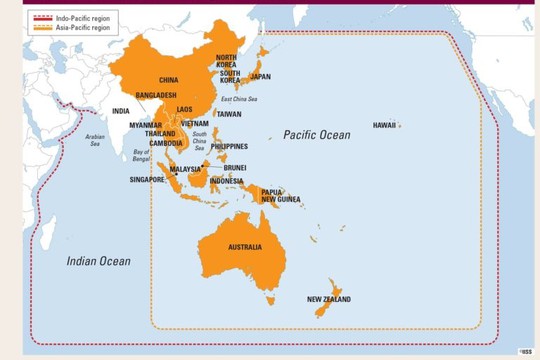French President Emmanuel Macron visited Colombo late July, after a tour of Pacific island states. From 24-28 July he visited New Caledonia, Vanuatu and Papua New Guinea (PNG) – the first a French colony, the second a former possession. The French Embassy described Macron’s brief stop in Colombo on 29 July as “an historic visit as it marks the first-ever visit by a French president to Sri Lanka and also the two countries celebrate 75 years of diplomatic ties this year.”
His tour of the Pacific islands too was similarly tagged as ‘historic’ in some media. It’s notable that Macron’s Pacific tour coincided with travel to the same region by some top US officials, including US Secretary of State Antony Blinken, to Tonga, and Defense Secretary Lloyd Austin to PNG. A closer look at the coincidental diplomatic activity in the Pacific (Oceania) may throw some light on what’s really historic about it, or rather, about what it signals, writes Lasanda Kurukulasuriya, an independent Colombo-based journalist, geopolitics observer.
Macron’s tweet posted on the website of the French Embassy said “Sri Lanka and France are two Indian Ocean nations that share a common goal: an open, inclusive and prosperous Indo Pacific.” What is the basis for the French president’s assertion that “Sri Lanka and France are two Indian Ocean nations?” After all, France is thousands of kilometers away from Sri Lanka. It is the French colonial territory of Reunion (population 982,574), an island in the Indian Ocean east of Madagascar.
It’s relevant to note that France has an enormous Extended Economic Zone (EEZ) on account of its overseas territories in the Pacific. They represent 6.9 million square km out of France’s total EEZ of 10.9 million square km, according to an analysis posted online by the Observer Research Foundation. “Macron wants to convince regional countries that France is not an outsider but part of the region, as France has overseas territories there,” wrote Ravindra Singh Prasad of “In Depth News”, citing a comment in “Global Times” by Cui Hongjian of the China Institute of International Studies.
In a region where geopolitical tensions between the US and China are intensifying, analysts speculate that Macron seeks to project a Pacific strategy distinct from that of the US and its western allies. This is against a backdrop of French displeasure with the US and UK, who together recently upstaged France over a submarine deal with Australia.
While Macron visited the Pacific Islands and Sri Lanka, US Secretary of State Antony Blinken was meanwhile in Tonga, ahead of travel to New Zealand and Australia. This was two months after he had visited Papua New Guinea to sign a US Defense Cooperation Agreement with that country. In PNG Blinken stood in for President Joe Biden who cancelled, reportedly to focus on debt talks in Washington. Had he gone, he would have been the first sitting US president to visit a Pacific island nation.
Responding to journalist’s question at a joint press conference with Tonga’s prime minister, as to whether his visit was “more of a US agenda and less what Tonga wants from the US,” Blinken said “The simple reality is this. We’re a Pacific nation.” And went on to elaborate on partnerships the US sought to build with countries throughout the Pacific. Blinken’s assertion – reminiscent of Macron’s tweet – begs the question as to why visiting VIPs feel a need to assert ‘belonging’ in distant regions.
A recap of events over the past 16 months would help at this point. In April 2022 the Solomon Islands signed a security pact with China that set off alarm bells in the West. Australia’s ABC News at the time reported that “The federal government has declared it is “deeply disappointed” that Solomon Islands has pressed ahead and signed a security pact with China – a deal Australia, New Zealand and the US fear could open the door to a Chinese naval base in the South Pacific.” All three had sought to dissuade Prime Minister Manasseh Sogavare from going ahead with it. The prime minister had earlier said “There is no intention to ask China to build a military base in Solomon Islands. We are insulted by such unfounded stories.”
Diplomatic events that followed this development, included the following:
February 2023: The US opened an embassy in the Solomon Islands
May 2023: The US opened an embassy in Tonga
May 2023: The US and Papua New Guinea (PNG) signed a Defense Cooperation Agreement.
July 2023: France opened an embassy in Samoa
24-29 July 2023: French President Emmanuel Macron toured New Caledonia, Vanuatu and PNG, and briefly met President Ranil Wickremesinghe in Sri Lanka
26-29 July 2023: US Secretary of State Blinken travelled to Tonga, New Zealand and Australia. In Tonga, responding to journalists’ questions he mentioned that the US was looking to open new embassies in Vanuatu and Kiribati. With reference to China’s engagement in the region he spoke of ‘problematic behaviour’ and ‘predatory economic activities.’
26 July 2023: US Defense Secretary Lloyd Austin visited PNG to discuss deepening security ties with Prime Minister James Marape and PNG Defense Council members.
These events shed light on the bigger picture.
What’s historic about the high profile visitors’ recent travels in the region is not that they are ‘firsts,’ but that they signal a tectonic shift to the Asia-Pacific as a geopolitical battlefield, caused by China’s rising global influence.
read more in our Telegram-channel https://t.me/The_International_Affairs

 11:18 13.09.2023 •
11:18 13.09.2023 •























